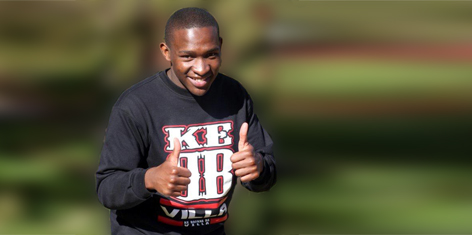
Victor Ngubeni, our first Face of Facebook winner, 2013/2014
Our sensational Kovsie Face of Facebook competition is about to launch into its second year.
This is a golden opportunity for students who want to be a regular in front of the camera. As the winner, you will present videos for our UFS Facebook and YouTube pages.
How to enter
You need to complete an entry form, which you can download from [KovsieLife] or [Blackboard]. You can also pick up an entry form at the reception desk in the Student Life Centre (SRC Building).
Submit your completed entry form at the reception desk mentioned above before 10:00 on Friday 11 April 2014.
Auditions
You will need to tell us in a minute, on video, why you should be our next Face of Facebook. Dress creatively, bring along props or posters and let your personality shine through.
The details for the auditions are:
- Date: Tuesday 15 April 2014
- Time: 08:30 – 13:00 and 14:00 – 16:30
- Place: Bloemfontein Campus, North Block (of the Main Building), ground floor
Voting
The top ten videos will be loaded onto our UFS Facebook page. The public can then vote for their favourite by ‘liking’ the video. Remember, only those who have ‘liked’ the UFS Facebook page will be able to vote.
After voting ends, the person with the most ‘likes’ will be the winner and serve as our 2014/15 Face of Facebook.
Now, get those entries in!